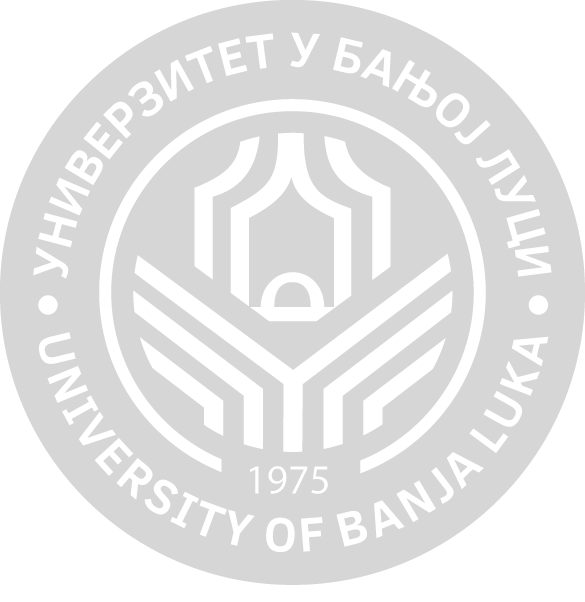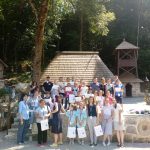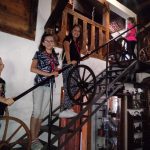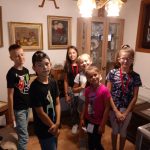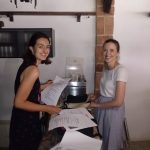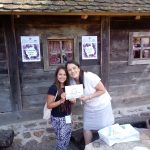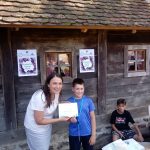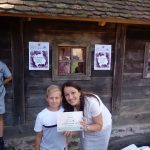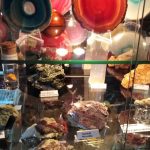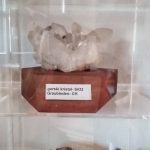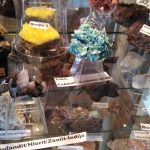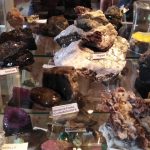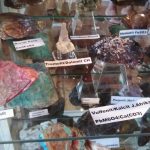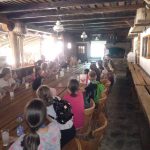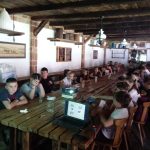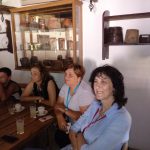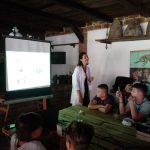
Ове године, програм о сировинама, RM@schools се шири и у Босни и Херцеговини захваљујући, “ESEE education initiatives” пројекту (грант 10009) који је подржан од стране „EIT raw materials“.
Природно-математички факултет, Универзитета у Бањој Луци је један од промотера овог пројекта. Испред студијског програма Хемија одржана је једнодневна интензивна љетња школа о сировинама, у етно селу-музеју „Љубачке долине“. Музеј садржи неколико тематских изложбених просторија, а у једној од њих се налази и импресивна колекција природних минерала.
Програм љетње школе је укључивао интерактивни час хемије одржан у полу-отвореној семинарској сали. Ученици су затим били подјељени у групе и имали кратко предавање о минералима, које су захваљујући колекцији у музеју могли видјети, додирнути и упознати се са неким од физичких особина минерала. По завршетку предавања ученици су радили тест с циљем да се провјери колико су информација са оба предавања упамтили. Резултати теста су били изненађујуће високи (скоро 80% тачних одговора), па је проглашено девет RM@schools шампиона, што нам показује да сировине могу да привуку пажњу ученика узраста 11-12 година, уколико се представе на интересантан и интерактиван начин. Најбитније од свега, ученицима је презентована карта Босне и Херцеговине која показује сва налазишта у држави, као што су: гвожђе, боксит, олово, цинк, со, пирофилит, бентонит, каолинит, креч, угаљ…
Такође, пројекат RM@schools – Ljubačke doline – 2019 је имао за циљ промовисање мира и разумјевања кроз науку, те су били присутни ученици сва три народа Босне и Херцеговине.
Укупно, љетњој школи је присуствовао 31 ученик основних школа „Иван Горан Ковачић“ из Бање Луке и „Доситеј Обрадовић“ из Приједора (подручне школе Ризвановићи и Хамбарине), региона са дугом рударском традицијом.
Са великим порастом међународних улагања у руднике Босне и Херцеговине, овакав тип пројеката би требало да мотивише дјецу како би се у будућности образовали у инжињере, хемичаре, геологе, екологе,… који би радили у интернационалним или националним компанијама које се баве сировинама, те да управо они буду мотивисани за очување околине своје земље, док раде на максималном развоју земље кроз експлоатацију природних ресурса.
“RM@schools” summer school first time in Bosnia and Herzegovina
The RM@schools program is spreading over the Bosnia and Herzegovina this year thanks to the support of the EIT raw materials-funded project “ESEE education initiatives” (grant 10009).
The task partner promoting it is the University of Banja Luka, Faculty of Science. Their Chemistry Department team has organized a one-day intensive summer school on a very creative place. In particular, the school was held in “Ljubačke doline – ethno village/museum”. The museum holds numerous thematic exhibitions dispersed in different rooms, one of them being the natural minerals collection. The program therefore included an interactive chemistry class held on semi-open air seminar room, after which the children were divided into groups and had a demonstrative short course in minerals getting familiar with an impressive collection at the museum. They had a test on the subjects they learned and selection of the RM@schools-champion which was very motivating. The results of the test had been quite high and nearly all the pupils had over 80% correct answers, showing that, if taught in the interesting and interactive way, the raw materials can indeed get the attention of the 11-12 years old age group.
In total 31 pupils and 2 teachers had participated from 2 schools. One school was selected from the Banja Luka city (Bosnian second largest city) and the other school was intentionally chosen from the remote area with mining history-the Prijedor region (iron- mining tradition). Also, this opportunity was used to promote peace and understanding so the groups had a nice balance of children belonging to three Bosnian major ethnic groups as well.
Finally, most importantly, the children were presented with the lively presentations of maps showing them a very rich Bosnian natural deposits like: iron, bauxite, lead, zinc, copper, salt, pyrophyllite, bentonite, kaolinite, lime, coal etc. With intensive increase in foreign investment in Bosnian mining industry, programs like this should lead to the grooming of the young experts in the future, who would be available as the engineers, chemists, geologists, environmentalist working in international or national companies dealing with raw materials. The best long term impact will be that they will be the most motivated ones to preserve the nature and use the green mining to protect their country while bringing about the most of the economical development through the exploitation of the natural resources.
